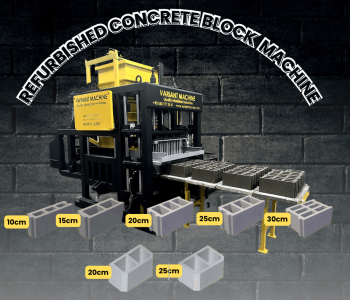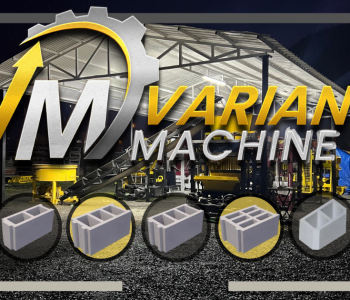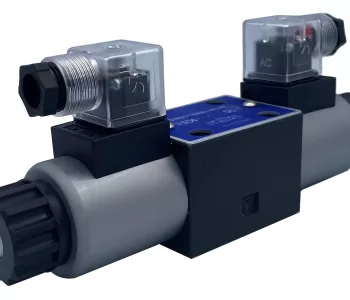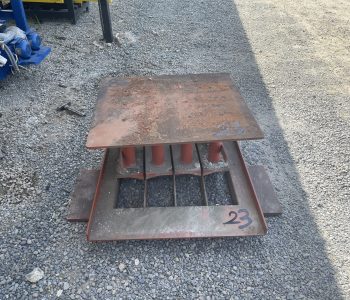Must-Read Insights Before Purchasing a Concrete Block Machine
Who We Are:
At Variant Machine, we manufacture and refurbish concrete block machines to provide affordable solutions for all investors. Our primary goal is customer satisfaction.
What Are Concrete Block Machines?
Concrete block machines are essential for manufacturers of construction materials. They use aggregates, cement, sand, and water to produce solid blocks. The typical machine layout starts with raw material bunkers, where materials are delivered to a mixer via conveyors. Cement is also delivered to the mixer from a silo using a screw conveyor. The mixer combines these materials into a homogeneous mortar, which is then delivered to machine hoppers for production.
In this process, the mortar is poured into buckets that transport it to female molds. The bucket moves forward and back, shaking to fill the molds. After filling, male molds press onto the mortar using a hydraulic press, while vibration motors run to eliminate air bubbles, ensuring strong blocks. The molds then rise simultaneously, completing the block production. The produced blocks are carried to a curing area using wheelbarrows or forklifts, depending on the facility’s setup. After the curing process, the blocks are ready for use.
Production Capacity
When discussing production capacity, we base our estimates on 20 cm hollow blocks using an 8-hour workday. For instance, a machine with a 67×45 cm pallet size can produce 3 blocks (20×20×40 cm) with each press, at a rate of 2 presses per minute. This means the machine can produce 2,880 blocks (20 cm) in a single day (8 hours). If you choose to produce 15 cm hollow blocks, the production capacity will increase, and working hours can also affect output.
Production Range
The production range depends on the machine specifications but can be adjusted by the manufacturer. After purchasing the necessary molds, machines can produce various types of blocks, including hollow blocks, curbstones, hollow floor blocks, and paving stones.
Advantages of Refurbished Concrete Block Machines
Refurbished concrete block machines are second-hand units that have been completely refurbished, offering factory owners affordable pricing. These machines were once successful before refurbishment. We acquire them from sellers looking to improve their businesses and refurbish them for new buyers, allowing them to own a machine at a lower cost.
Refurbishment Process
Initially, our engineers assess the production quality of the machines before purchase. We do not buy machines that do not function properly. After acquiring a machine, our engineers and technicians conduct a thorough examination to determine which parts need replacement and what improvements should be made. We don’t just paint the machines; we restore them to like-new condition. This includes replacing all hydraulic systems, checking and replacing electrical systems, and ensuring vibration motors are functioning optimally.
Choosing the Right Blocks
The choice of blocks depends on local market trends. Conducting market research is crucial for selecting the right molds, which can significantly impact your success. Proximity to target markets is also essential, so consider local demand when selecting molds. Initially, you can purchase a few molds, but as you gain experience, you may expand your range to include different molds tailored to your region.
Maintenance and Spare Parts
When purchasing a machine, choose a manufacturer that offers spare parts and maintenance support. These machines can operate 24/7 with proper maintenance. However, difficulty in sourcing spare parts can disrupt your operations, affecting both productivity and success.
Automation Levels
For medium machines, the most common automation levels are:
- Semi-Automatic: Operated by an operator with products moved manually using wheelbarrows. This system is recommended for small to medium facilities.
- Automatic: Features two robots within the machine layout—one at the back for unloading pallets and another at the output for stacking. This system allows for carrying multiple pallets at once, reducing labor costs and minimizing space requirements, but requires forklifts for transport. It is ideal for medium to large facilities.
- Fully Automatic System: In this configuration, all production processes are managed by a computer. However, you will need additional equipment such as silos, weighing bunkers, unloading robots, stacking robots, and forklifts for efficient operation. This system is best suited for large facilities.
Conclusion
Refurbished concrete block machines offer a cost-effective solution for manufacturers looking to enhance their production capabilities. With a thorough refurbishment process, these machines can operate efficiently and effectively, providing high-quality blocks to meet market demands. By selecting the right molds and ensuring proper maintenance and support, investors can establish a successful business in the construction materials industry. Choosing the right level of automation will further streamline operations, reduce labor costs, and optimize production efficiency, making refurbished machines an excellent investment for both new and experienced manufacturers.



